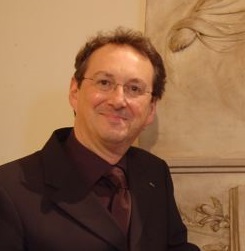Peter Phillips (conductor)
| Peter Phillips | |
|---|---|
 |
|
| Born | 15 October 1953 |
| Nationality | British |
| Alma mater | St John's College, Oxford |
| Occupation | Choral conductor, musicologist |
| Spouse(s) |
|
| Children |
|
Peter Phillips (born 15 Oct 1953) is a British choral conductor and musicologist. He was the founder of The Tallis Scholars in 1973 and of Gimell Records (with Steve Smith) in 1980.
Phillips was born in Southampton and educated at Winchester College (1967–71), the RSCM (1972) and St John's College, Oxford (Organ Scholar 1972–75). He studied music with Hugh Macdonald, Denis Arnold and David Wulstan. He subsequently taught at Oxford University, Trinity College of Music and the Royal College of Music in London (where he directed the Chamber Choir in succession to David Willcocks), but had resigned all these posts by 1988 in order to pursue a full-time career in conducting.
Phillips's first concert with the Tallis Scholars took place in the St Mary Magdalen's Church, Oxford on November 3, 1973. The group was made up of choral scholars (hence the use of the word 'Scholars' in the title) and layclerks from the leading Oxbridge choral foundations. From the start Phillips aimed to produce a distinctive sound, influenced by choirs he admired, in particular the Clerkes of Oxenford. However the repertoire he chose was idiosyncratic, based in his desire to explore neglected corners of the polyphonic repertories, continental as much as English. This first concert included music by Obrecht, Ockeghem and Lassus. After the foundation of Gimell Records in 1980, the Tallis Scholars have gone on to fill many gaps in the recording catalogue, making discs devoted to such relatively unknown composers as Obrecht, Ockeghem, Cardoso, White, Clemens, Gombert and Mouton. Since winning the Gramophone Record of the Year Award in 1987, the Tallis Scholars have been recognised as perhaps the world's leading ensemble in interpreting renaissance polyphony.
...
Wikipedia
